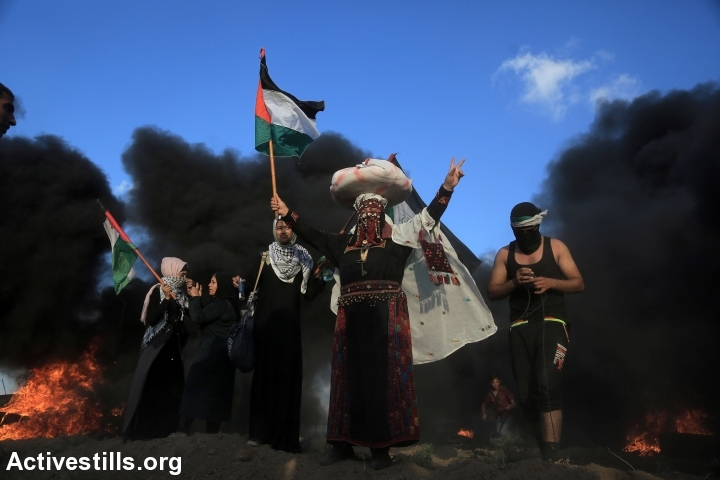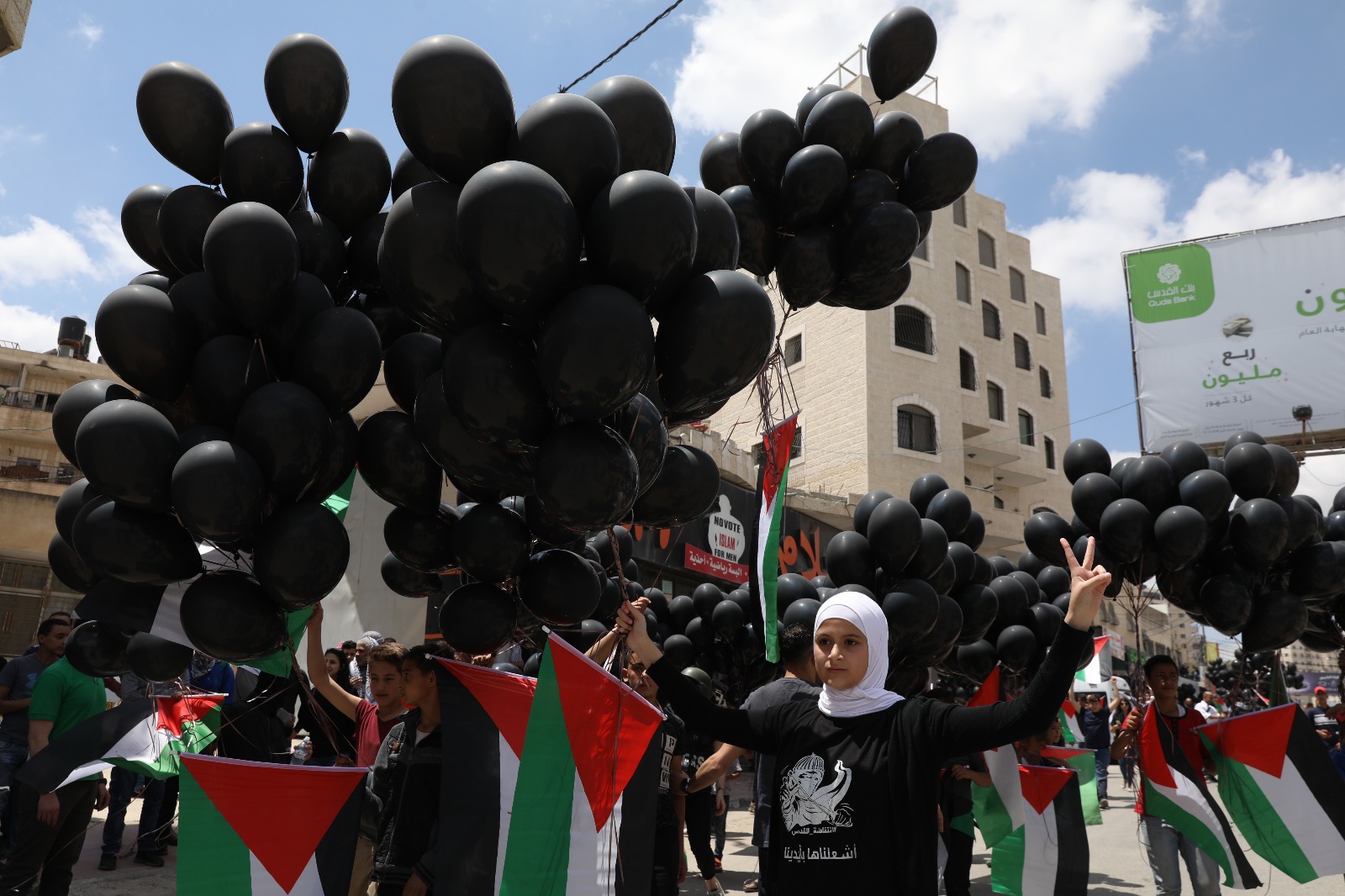The Great Return March signals a shift for the Palestinian people, says scholar Tareq Baconi. Palestinians are no longer fighting for a state, and are increasingly demanding their full rights — primarily the right of return.

The leaders of the Great Return March surprised the world when they organized the first demonstration along the Israel-Gaza fence on March 30, 2018. Tens of thousands of Palestinians participated. Already in the inaugural protest, Israeli snipers opened fire; they killed 14 Palestinians and wounded around 1,200 more.
The protests turned into a weekly demonstration as tens of thousands of Gazans showed up along the fence every Friday. The Israeli army continued to fire at them. The leaders of the marches, a group of about 20 activists, mostly secular or left-leaning, tried as best as they could to prevent people from getting too close to the fence. Hamas, which originally provided logistical support that contributed to the success of the protests (namely, commutes and publicity), slowly started to play a more significant role in the marches.
Hamas forced its way into the Great Return March and may have taken over the protests, but without Hamas, Gaza wouldn’t have been able to ease the blockade as much. Hamas is a political force that can deal with Israel in a manner that neither Fatah nor the Palestinian Authority is capable of.
This is the assessment according to Tareq Baconi, a young Palestinian intellectual and researcher, previously a member of the European Council for Foreign Relations and currently an analyst with International Crisis Group. He is one of the most knowledgeable experts on the Hamas. Baconi’s new book, Hamas Contained: The Rise and Pacification of Palestinian Resistance, explores Hamas’ transition from armed struggle to popular resistance.
I spoke with Baconi about one of the most significant stories of 2018 — the marches for return in Gaza. A lot has been said about Hamas’ involvement, if not takeover, of the movement that began as a popular protest.
Palestinians in Gaza are critical of Hamas’ religious coercion, its intervention in the everyday lives of residents, and its hostility with Fatah. Israeli media likes to show the people of Gaza accusing Hamas of the siege, of poverty and of casualties following Israeli strikes, but this is not the case.
Baconi, the son of Palestinian refugees from Haifa and Jerusalem, was raised in Amman and currently lives in Ramallah. In our conversation, he did not spare criticism on Fatah, Hamas and the Palestinian leadership in Israel, but he repeatedly emphasized that, at the basis of his analysis is Israel and the egregious crimes it’s committing: the occupation, and the Gaza blockade.

First, what do you think of the Great Return March?
“The marches are a source of hope. They indicate that the politics of Hamas and Fatah have failed, that the American-led track of negotiations has also failed, but the Palestinian people remain steadfast, and are still demanding their rights from ’48, not ’67, primarily the right of return. Political factions may have failed, but the people are still holding on to their values, and are demanding the same rights they have fought for from the start.”
“The Palestinian people are at a point of transition, shifting from demanding a state to demanding their rights. It’s a shift toward a civil rights movement, and Gaza is leading the way. Even though there were protests in the Palestinian diaspora, in Syria and Lebanon, and within ’48, in Haifa, the way the marches started in Gaza shine a light on a path forward, and indicate a new development. As far as I’m concerned, it’s a source of hope. But it also shows the challenges that we are about to face, in the way the marches evolved, in the way Hamas dealt with the protests, and of course, in the way Israel responded to them.”
In the past year, something has changed in the Palestinian street.
“Indeed, I have no doubt. And it’s not just this past year, it’s the last two years, dating back to the “prayer intifada” in Al-Aqsa. But you can also see it in ’48, the way politicians are talking about equality — even though they’re dealing with their problems as citizens, this language has had an impact on the Palestinian people. It allowed them to see politicians who were different from Abbas and Hamas. It gave them new approaches to the struggle, and a way to deal with the challenges on a rights basis.”
“This transition period we’re in, it’s been going on for more than a year, maybe two or three years. This year brought the biggest change because of U.S. policy. When we saw what happened in Jerusalem and to UNRWA, it led to a split. The politicians are used to repeating the same statements, and are still pinning their hopes on American policy. The people understand that this is it, that we can’t keep going on the same way. So, even though there isn’t a new political movement on the rise, we can see a huge change among the people. Both in terms of an ambivalence as to where we’re headed, but also in terms of hope. That we can organize to struggle for our full rights, based on ’48, rather than accept semi-equality just to go on with our lives.”
I tell Baconi that the dissonance between the Palestinian people and the PA was palpable at the protest against the sanctions the PA was imposing on Gaza, which I took part in last June, in Ramallah. I witnessed first-hand the violence Palestinian forces applied on protesters. I sense there’s anger toward the PA.
“There’s a lot of anger, and the PA can no longer deny what’s going on. When protests erupted in late November in al-Khalil (Hebron), we saw photos of Palestinian forces dealing with protesters as the occupation forces would have.”
“What more, there is no longer an economic justification for the PA. The people are tired of the dire economic situation. It might have been different if the PA had been able to offer an adequate standard of living — which is the principle the PA bases itself on: to ignore the occupation and give the impression that it is the sole entity governing Palestinian lives — had it been able to provide them with a comfortable life economically. But even that doesn’t exist. There’s no American-led reconciliation process, living conditions are unbearable, and you can see images of the occupation and the PA working hand in hand.”
“On the other hand, people see the way Hamas dealt with the marches, and they realize that Hamas is at least capable of poking holes in the occupation. It’s able to strengthen its political position in a way the PA isn’t. So, of course there’s anger.”
Do you feel that people are also angry at Hamas, for the way it intervened in the marches?
“I believe, 100 percent, that Hamas intervenes in everything. But Hamas provided the return movement with the infrastructure to expand the way it did. So, there’s tension. On the one hand, these are protests based on the right of return, started by civil society, attended by hundreds in Gaza. They introduced a new politics, and allow us a glimpse into the future of the Palestinian struggle. I have no doubt that this is what the marches are based on.”
“On the other hand, Hamas played a big role in providing resources, in allowing the movement to grow, and in bringing Israel to agree to concessions. They managed to force Israel to ease the blockade. If Hamas hadn’t engaged with the return marches, do you think the movement would have been able to achieve the same concessions from Israel?”
Good question. I don’t have an answer.
“In terms of loosening the blockade, in terms of allowing goods into Gaza — if Hamas hadn’t intervened in the protests the way it had, I don’t think Israel would have made these concessions to Gaza.”
“This is difficult for me to admit, because I’d rather these protests had nothing to do with Hamas. At the same time, I’ve seen Hamas become a political force that can handle Israel in a way Fatah and the PA are not capable of. They were able to leverage their bargaining position with Israel through the protests.”
“I’m always critical of Hamas. But it’s important for me that the Israeli audience understand that, unlike what they’re told by Israeli media, even if Hamas provided the infrastructure and eventually took over the protests, the marches are not a security threat. No Israeli soldier has the right to fire at protestors in Gaza, because the protests don’t pose any danger to Israelis.”

On May 14, 2018, a day before the commemoration of the Nakba and the day the U.S. moved its embassy to Jerusalem, Israel crossed all the red lines when its soldiers killed 68 protestors at a march that hundreds of thousands of Palestinians participated in. Overall, based on the most cautious estimates, from the start of the Great Return March until December 2018, 235 Palestinians were killed (including 60 casualties who were killed in air strikes throughout the year). Six months into the weekly protests, more than 25,000 people were wounded, many of whom had to have their legs cut off as a result of unusually large and destructive bullet wounds. Everyone believes the demonstrations will go on. They remain the most talked about topic on the streets of Gaza.
What do you think will happen with the protests in Gaza in 2019? Will they continue?
“I believe the marches will continue. In the last hudna (cease-fire agreement), Hamas agreed to reduce the number of protestors so that Israel won’t strike in Gaza. It’s unclear how long this equilibrium will hold up. Based on my research of Hamas, I know that if Israel doesn’t ease the siege, and if it doesn’t allow people movement through the crossings, Hamas will be obliged to pressure Israel to act on its end of the agreement.”
“Following every war and Israeli strike on Gaza, from 2007 until this day, Israel is the one to violate the terms of the agreement, and it forces Hamas to respond with violence again. There’s no way of knowing how these negotiations will impact the marches in the future, but I believe that, no matter what ends up happening between Israel and Hamas, the marches will continue. Even if they don’t continue on the same scale, there’s no political resolution on the horizon. I believe we’re going to see more popular movements and uprisings, not only in Gaza but all over, including in the diaspora and ’48.
And how do you think this will affect the PA?
“That’s a big question. Unfortunately, the PA will keep applying military force on protestors. It will keep suppressing protests. The big change will happen once we figure out the fate of the Palestinian Authority after Abbas. I want to believe that there will be a positive change, but it’s very likely that the PA’s policies and security coordination with Israel will remain.”
“I’m not sure how much longer the PA can keep controlling the Palestinian people. Things are deteriorating socially and politically, especially if there’s no political solution with the Israelis. With the Palestinians under the oppression of both the occupation and the PA, something is bound to happen. The change is not yet known, but I don’t think the situation in the West Bank is sustainable.”
A version of this article was first published in Hebrew on Local Call. Read it here.

